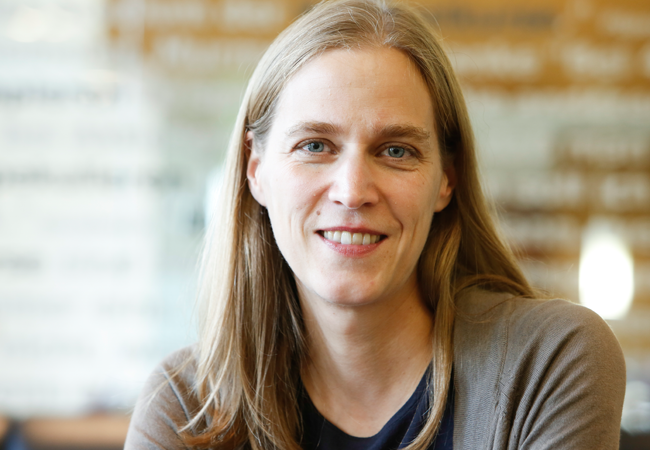
Economist with a broad range of interests
Economist Nicola Fuchs-Schündeln, Professor of Macroeconomics and Development at Goethe University Frankfurt, has been awarded the Gottfried Wilhelm Leibniz Prize 2018 worth € 2.5 million. This was announced by the Joint Committee of the German Research Foundation (DFG) on 14 December in Bonn.
Expressing her congratulations, Professor Birgitta Wolff, President of Goethe University Frankfurt, said: “This is a tremendous and deserved recognition of Nicola Fuchs-Schündeln’s extraordinarily successful scientific work. She plays a prominent role in Germany’s economics landscape and can already look back on an impressive international career.
Her innovative research approach unites microeconomics and macroeconomics and she tackles topics and research objects which are at times rather unexpected for economists. Professor Fuchs-Schündeln is a real inspiration for many.”
How do the values of people who were socialized in the GDR differ from those of their fellow countrymen in the west? For example, years after the end of socialism, former GDR citizens still believed that the state should look after families, the elderly and the sick. Peoples’ preferences in the east and west of Germany are only gradually becoming aligned.
The “Endogeneity of Preferences” is one of the research priorities of Professor Nicola Fuchs-Schündeln, 45. Her paper on different values in east and west met with considerable international acclaim – especially because it has refuted the traditional assumption that economic preferences are innate and unchangeable, regardless of the economic system. Her work has triggered many other studies in this area and consolidated her reputation as a leading international expert. She is one of the most frequently cited researchers in this field.
Nicola Fuchs-Schündeln’s research style is broad and interdisciplinary in her other areas of specialization too. For example, she is also dealing in depth with the saving, consumption and labour market behaviour of private households, where she is conducting empirical work to put the assumptions and predictions of fundamental economic theories to the test.
One of the topics she has investigated in this context is what compels people to save money. Here she was able to use the situation that evolved following German reunification as the basis for her research: The dramatic economic upheaval in the east of the country allowed her to make clear theoretical forecasts and test them with data.
Nicola Fuchs-Schündeln succeeded in corroborating a mostly rational consumption and saving behaviour over the entire lifespan, even in the face of major economic upheaval. Her recent work explores the question of why Europeans work less hours per year than US Americans and points to the tax system, which in her view plays a key role. Nicola Fuchs-Schündeln has also made significant contributions to analysing inequality trends in Germany as well as to the study of inner-European and inner-German migration and the long-term effects of a socialist school education on the labour market.
Nicola Fuchs-Schündeln has been Professor of Macroeconomics and Development at Goethe University Frankfurt since 2009. She is engaged as Principal Investigator in the Cluster of Excellence “The Formation of Normative Orders” and as Programme Director at the LOEWE Centre “Sustainable Architecture for Finance in Europe”.
In 2015/16 she spent a year at Stanford University, California, as visiting professor. Nicola Fuchs-Schündeln worked as an assistant professor at Harvard before joining Goethe University Frankfurt. She studied Latin American Studies and Economics in Cologne and earned her doctoral degree at Yale University.
The Leibniz Prize is not the first award for Nicola Fuchs-Schündeln: Last year she received the most important prize for German economists, the Gossen Award of the Verein für Socialpolitik, one of the largest professional economics associations in Europe. This award goes to German-speaking researchers whose work has earned an international reputation.
The main benchmark here is publications in internationally recognized journals. She also received a Starting Grant from the European Research Council in 2010, one of the European Union’s most highly endowed research awards.
The financial support that the Leibniz Prize brings with it will allow Nicola Fuchs-Schündeln to further advance and expand her innovative research projects and bring more junior researchers to Goethe University Frankfurt.
Award winners can draw on the € 2.5 million in funding over a period of seven years and are flexible in how they use it. The objective of the Leibniz Programme, which was established in 1985, is to improve working conditions for outstanding researchers, enhance their research opportunities, relieve them of administrative tasks and help them employ particularly qualified junior researchers.
Nicola Fuchs-Schündeln is the 17th researcher from Goethe University Frankfurt to receive the Leibniz Prize: In 1986, both philosopher Jürgen Habermas as well as the later Nobel Prize laureate and biochemist Hartmut Michel received the coveted award. They were followed by historian Lothar Gall (1988), physicist Reinhard Stock (1989), legal historian Michael Stolleis (1991), mathematician Claus-Peter Schnorr (1993), physicist Theo Geisel (1994), chemist Christian Griesinger (1998), palaeontologist Volker Mosbrugger (1999), biologist Stefanie Dimmeler (2005), historian Bernhard Jussen (2007), economist Roman Inderst (2010), philosopher and political scientist Rainer Forst (2012), biochemist and physician Ivan Dikic (2013), jurist Armin von Bogdandy (2014) and ancient history scholar Hartmut Leppin (2015).
[dt_call_to_action content_size=”small” background=”fancy” line=”true” style=”1″ animation=”fadeIn”]
Further information: Professor Nicola Fuchs-Schündeln, Chair of Macroeconomics and Development, Faculty of Economics and Business Administration, Theodor-W.-Adorno-Platz 3, Westend Campus, Tel.: +49(0)69/798-33815, email: fuchs@wiwi.uni-frankfurt.de.
[/dt_call_to_action]
Source: Press Release 19/12/2017








